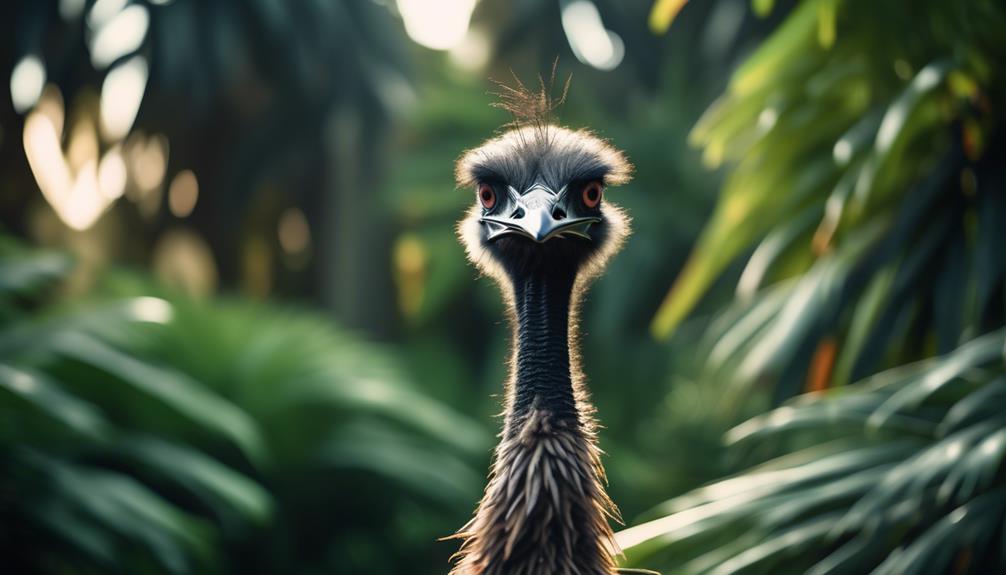
Have you ever wondered how the diet of an emu can affect the quality of its feathers? Well, it turns out that what these magnificent birds eat plays a crucial role in the appearance and health of their feathers. From the building blocks of protein to the essential vitamins and minerals, every nutrient has a role to play in maintaining the lustrous plumage of emus.
But it doesn't stop there. The impact of fatty acids, fiber, and even the bird's gut health can also influence the quality of its feathers.
So, if you're curious to learn more about how diet can make a difference in the feathered world of emus, hang on tight because we're about to take you on a fascinating journey.
Key Takeaways
- Feathers require a diet rich in protein for optimal growth and maintenance.
- Adequate intake of vitamins and minerals, such as vitamin A and zinc, is necessary for healthy feathers.
- Omega 3 fatty acids are beneficial for vibrant and resilient feathers.
- Proper hydration through adequate water intake is essential for maintaining feather quality.
Importance of Diet for Emu Feathers
Your emu's diet plays a crucial role in determining the quality of its feathers. Feathers serve multiple purposes, including insulation, flight, and display. To maintain healthy feathers, it's essential to provide your emu with a diet that's rich in nutritional value and maintains a proper dietary balance.
Feathers are primarily composed of protein, specifically keratin. Therefore, ensuring an adequate intake of protein is vital for feather growth and maintenance. Emus require a diet that includes sources of high-quality protein, such as insects, seeds, and plant matter. These protein sources provide essential amino acids necessary for feather development.
Additionally, a diet that maintains a proper dietary balance is essential for optimal feather quality. Emus require a mix of macronutrients, including carbohydrates, fats, and vitamins. Carbohydrates provide energy for feather growth, while fats contribute to feather health and waterproofing. Vitamins, such as vitamin A and vitamin E, play a crucial role in maintaining feather structure and integrity.
To ensure your emu's feathers are of the highest quality, it's essential to provide a varied and balanced diet. Consult with a veterinarian or avian nutritionist to develop a feeding plan that meets your emu's specific nutritional needs. By providing a diet rich in nutritional value and maintaining dietary balance, you can help promote healthy feather growth and maintain the overall well-being of your emu.
Nutritional Requirements for Feather Quality
The nutritional requirements for optimal feather quality in emus are essential for promoting healthy growth and maintenance. Nutritional deficiencies can have a detrimental effect on feather development, leading to poor quality feathers that are more prone to damage and breakage. To ensure the best possible feather quality, it's important to provide emus with a balanced diet that meets their specific nutritional needs.
One key aspect of emu nutrition is the intake of protein. Feathers are primarily composed of protein, so a diet that's deficient in this essential nutrient can result in weak, brittle feathers. Emus should be provided with a diet that includes high-quality sources of protein, such as insects, fish, and legumes.
In addition to protein, emus also require adequate amounts of vitamins and minerals for optimal feather quality. Certain vitamins, such as vitamin A and biotin, are particularly important for maintaining healthy feathers. These vitamins can be obtained through a well-rounded diet that includes a variety of fruits, vegetables, and grains.
In some cases, dietary supplements may be necessary to address specific nutritional deficiencies. However, it's important to consult with a veterinarian or avian nutritionist before adding any supplements to an emu's diet. They can help determine the appropriate dosage and ensure that the supplements don't interfere with the absorption of other nutrients.
Protein: The Building Block of Beautiful Feathers
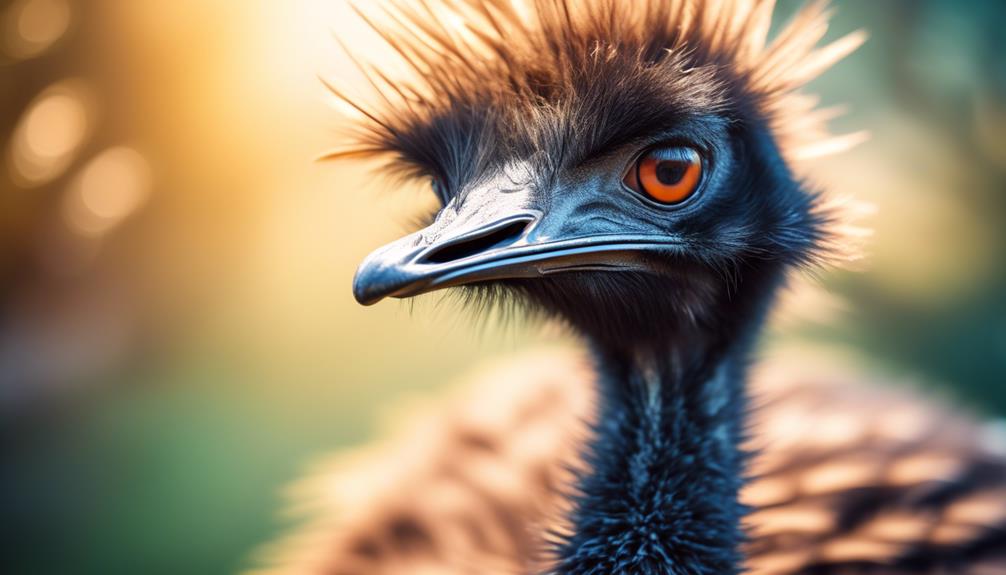
Protein plays a crucial role in the development and maintenance of emu feathers, serving as the fundamental building block for their beautiful plumage. Emus require a diet rich in high-quality proteins to ensure optimal feather growth and coloration. Feathers are composed primarily of keratin, a protein that provides structural support and strength. Without an adequate protein supply, emus may experience reduced feather quality, leading to dull and brittle plumage.
Protein supplementation can be beneficial for emus, especially during periods of feather growth and molting. By providing supplementary protein sources, such as insects or legume-based feed, emus can meet their increased protein requirements and support the development of healthy feathers. However, it's important to consider dietary restrictions when incorporating protein supplements.
Emus have specific nutritional needs, and an imbalance in their diet can lead to negative health consequences. Therefore, it's crucial to consult with a veterinarian or avian nutritionist to ensure proper protein supplementation without compromising overall dietary balance.
Role of Vitamins and Minerals in Feather Health
To support optimal feather health in emus, a balanced diet rich in essential vitamins and minerals is crucial. Vitamin deficiencies and mineral imbalances can have a significant impact on the quality of emu feathers.
Vitamins play a vital role in feather development and maintenance. For example, vitamin A is essential for the growth of feathers and the formation of keratin, the protein that makes up feathers. A deficiency in vitamin A can lead to poor feather quality, including dryness, brittleness, and decreased feather strength. Similarly, vitamins B and E are important for proper feather growth and maintenance.
Minerals also play a crucial role in feather health. Iron is necessary for the production of hemoglobin, which carries oxygen to the feathers. A deficiency in iron can lead to anemia and compromised feather health. Zinc is another essential mineral for feathers, as it's involved in the synthesis of keratin. A deficiency in zinc can result in feather abnormalities, such as reduced feather growth and increased feather breakage.
Impact of Fatty Acids on Feather Appearance
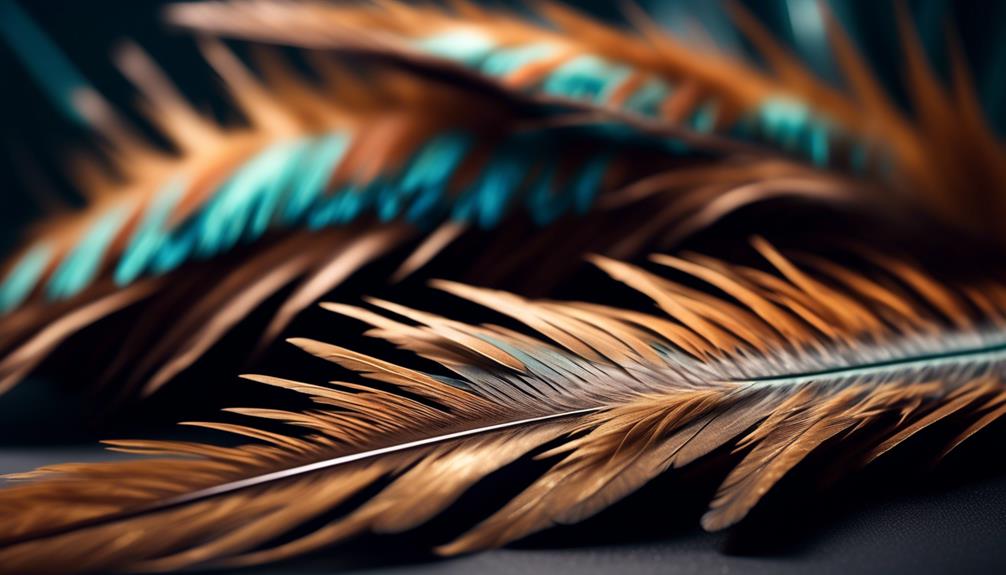
Fatty acids play a crucial role in determining the appearance of emu feathers. Specifically, a deficiency in fatty acids can have detrimental effects on feather quality. Omega 3 fatty acids, in particular, have been found to have positive effects on feather appearance.
When emus lack sufficient fatty acids in their diet, their feathers may become dry, brittle, and dull in appearance. This is because fatty acids are essential for maintaining the integrity and health of the feathers. Without an adequate supply of these essential nutrients, the feathers can lose their natural luster and become more prone to damage.
On the other hand, incorporating omega 3 fatty acids into the emu's diet has been shown to have positive effects on feather appearance. Omega 3 fatty acids are known for their anti-inflammatory properties and their ability to promote healthy skin and hair. When emus consume an adequate amount of omega 3 fatty acids, their feathers are more likely to be vibrant, shiny, and resilient.
The Link Between Water Intake and Feather Quality
Water intake plays a vital role in maintaining optimal feather quality in emus. Adequate water intake is essential for maintaining proper hydration levels, which directly affects feather moisture and, consequently, their health. Feathers are primarily composed of keratin, a protein that requires sufficient water to maintain its structural integrity and elasticity. When emus consume an adequate amount of water, their feathers remain hydrated and pliable, enabling them to withstand environmental stressors and maintain a healthy appearance.
The relationship between hydration and feather health is a complex one. Insufficient water intake can lead to dehydrated feathers, which become brittle and prone to breakage. Additionally, dehydrated feathers are more susceptible to damage from external factors such as sunlight and abrasive surfaces. On the other hand, excessive water intake can lead to overhydration, which can negatively impact feather quality by causing them to become excessively soft and prone to matting.
To ensure optimal feather quality, emus should have access to clean and fresh water at all times. Providing a consistent source of water allows emus to regulate their hydration levels and maintain feather moisture. Monitoring water intake and making adjustments as necessary can help ensure emus receive adequate hydration without the risk of overhydration.
Understanding Antioxidants and Feather Protection
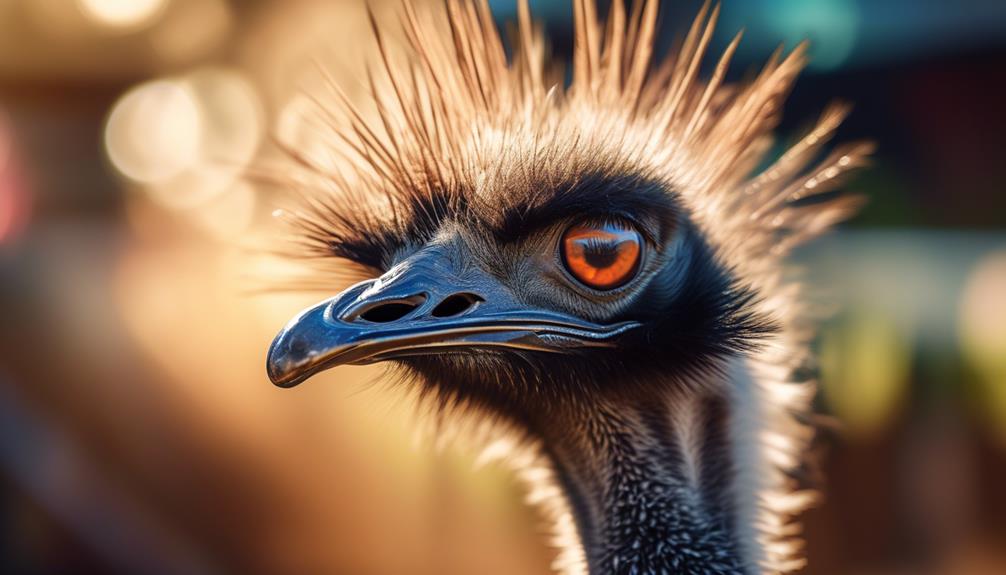
Emu feather quality can be further enhanced through an understanding of the role of antioxidants in providing protection and maintaining their structural integrity. Antioxidants are compounds that help protect cells from damage caused by free radicals, which are highly reactive molecules that can lead to oxidative stress. Feathers are constantly exposed to environmental stressors such as UV radiation, pollutants, and physical wear and tear. This exposure can lead to the production of free radicals and subsequent damage to the feathers' structural proteins.
By incorporating antioxidants into their diet, emus can benefit from the protective effects of these compounds. Antioxidants scavenge free radicals, neutralizing their damaging effects and preventing further degradation of the feathers. Research has shown that dietary supplementation with antioxidants can improve feather quality in birds, including emus. The benefits of antioxidants extend beyond feather protection, as they also play a crucial role in overall health and well-being.
To help you understand the potential benefits of antioxidants for emu feather quality, the table below summarizes some key antioxidants and their sources:
| Antioxidant | Source |
|---|---|
| Vitamin E | Nuts, seeds, vegetable oils |
| Vitamin C | Citrus fruits, berries, leafy greens |
| Beta-carotene | Carrots, sweet potatoes, spinach |
| Selenium | Brazil nuts, seafood, poultry |
Incorporating these antioxidant-rich foods into an emu's diet can provide the necessary nutrients for maintaining feather health and protecting against oxidative damage.
The Influence of Carotenoids on Feather Coloration
Carotenoids play a significant role in determining the coloration of feathers in various bird species. These naturally occurring pigments are responsible for the vibrant reds, oranges, and yellows observed in many avian feathers. The presence and concentration of carotenoids in a bird's diet directly affect feather pigmentation.
Dietary sources of carotenoids are crucial for maintaining feather coloration. Birds can't synthesize carotenoids de novo, so they rely on obtaining them from their food. Fruits, vegetables, and insects are common dietary sources of carotenoids for birds. These pigments are absorbed through the digestive system and transported to the growing feathers.
Research has shown that the quality and quantity of carotenoids in a bird's diet directly impact feather pigmentation. Birds with access to a diverse range of carotenoid-rich foods tend to exhibit more intense and vibrant feather colors. Conversely, birds with limited access to carotenoids may have duller or paler feathers.
Carotenoids act as antioxidants, protecting feathers from damage caused by free radicals and environmental stressors. Feathers with higher carotenoid content are more resistant to fading and degradation. Therefore, a diet rich in carotenoids not only enhances feather coloration but also promotes feather health and longevity.
Effects of Fiber on Emu Feather Quality
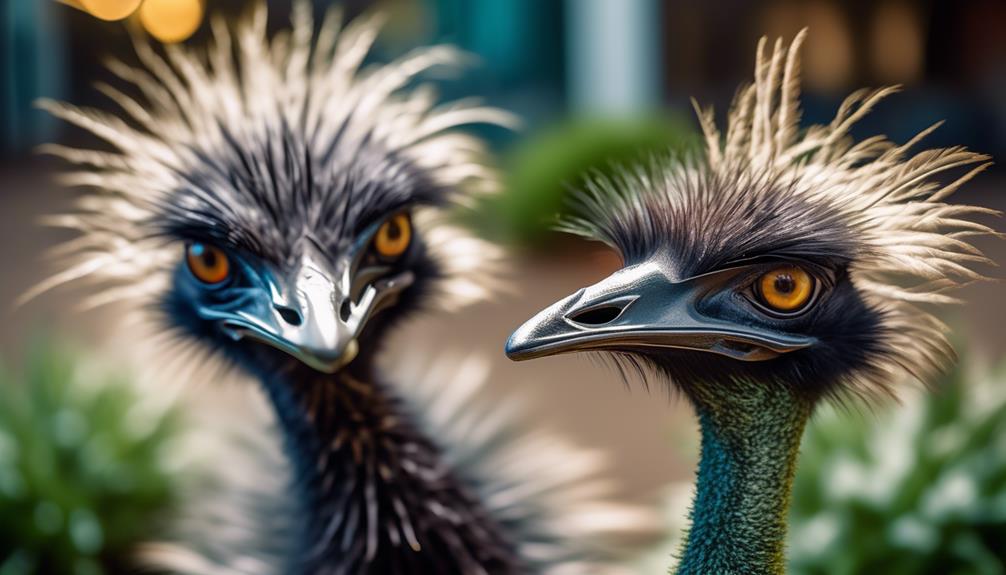
The role of dietary components extends beyond carotenoids to include fiber. Fiber is an essential component of the emu's diet as it promotes healthy digestion and nutrient absorption, both of which are crucial for feather health. Adequate fiber intake ensures proper hydration, which in turn affects feather quality. Emus that consume an appropriate amount of fiber are more likely to have well-hydrated feathers, resulting in a lustrous appearance and improved overall feather quality.
Moreover, fiber also plays a significant role in maintaining the health of the emu's gut microbiota. The gut microbiota refers to the diverse community of microorganisms that reside in the emu's digestive system. These microorganisms help break down dietary fiber, producing short-chain fatty acids that provide energy to the emu and support the growth of beneficial bacteria. A healthy gut microbiota contributes to improved feather health by promoting nutrient absorption and preventing the growth of harmful bacteria that can negatively impact feather quality.
Gut Health and Its Impact on Feather Growth
Proper gut health is crucial for optimal feather growth in emus. A healthy gut supports the digestion and absorption of nutrients necessary for feather development. The presence of beneficial gut bacteria and the production of digestive enzymes play a significant role in maintaining gut health and promoting feather growth.
Here are three key factors highlighting the importance of gut health in emus:
- Gut bacteria: The gut of emus is home to a diverse community of microorganisms, including bacteria. These bacteria help in the breakdown and fermentation of dietary components, such as fiber, into smaller, more easily digestible molecules. They also produce essential vitamins and short-chain fatty acids that contribute to overall gut health. Imbalances in gut bacteria populations can negatively impact digestion and nutrient availability, ultimately affecting feather growth.
- Digestive enzymes: Emus rely on digestive enzymes to break down complex macronutrients, such as proteins, fats, and carbohydrates, into simpler forms that can be absorbed by the body. Enzyme deficiencies or imbalances can hinder nutrient absorption and utilization, leading to inadequate feather growth. Maintaining a healthy gut environment promotes the production and activity of digestive enzymes, ensuring efficient nutrient digestion and absorption.
- Gut-brain axis: The gut and the brain communicate through a bidirectional pathway known as the gut-brain axis. This connection allows the gut to influence various physiological functions, including feather growth. Stress, for example, can disrupt gut health by altering the composition of gut bacteria and reducing enzyme activity. Consequently, compromised gut health can impair feather growth.
The Role of Stress in Feather Quality
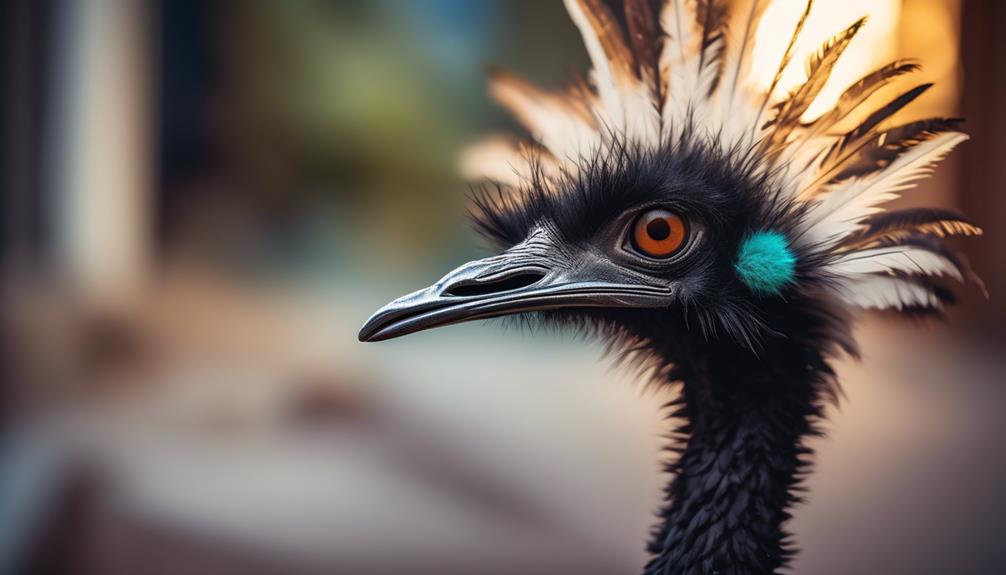
In considering the impact of stress on feather quality, it's essential to recognize the intricate connection between the gut-brain axis and its potential influence on emus' feather growth. Stress, both acute and chronic, can have significant effects on feather appearance and overall quality.
Studies have shown that increased stress levels can lead to decreased feather growth rates and alterations in feather structure. When emus experience stress, their body releases stress hormones, such as cortisol, which can disrupt the normal growth and development of feathers. This disruption can result in feather abnormalities, such as decreased feather density, increased barbule spacing, and reduced feather strength.
Furthermore, stress can also impair the pigmentation process of feathers. Melanocytes, the cells responsible for producing melanin, the pigment that gives feathers their color, can be negatively affected by stress. This can lead to changes in feather coloration, such as fading or dullness.
The role of stress in feather growth is complex and multifaceted. It's influenced by various factors, including the duration and intensity of the stressor, as well as individual differences in stress responsiveness. To optimize feather quality, it's crucial to minimize stressors and provide environments that promote emotional well-being for emus.
Recommendations for Optimal Diet and Feather Care
To optimize emu feather quality, it's essential to implement a well-balanced and nutrient-rich diet regimen. Feathers are composed mainly of protein, so ensuring an adequate intake of protein is crucial for healthy feather growth. Additionally, incorporating essential fatty acids into the emu's diet can improve feather quality by promoting proper oil production and reducing dryness and brittleness.
Here are some recommendations for optimal diet and feather care:
- Feather growth techniques: Regularly grooming and cleaning emu feathers can help maintain their quality. This involves removing dirt, debris, and excess oils that can accumulate and weigh down the feathers. Gently combing through the feathers with a wide-toothed comb can also help prevent tangles and matted feathers.
- Feather care products: Using specialized feather care products can further enhance feather quality. Feather conditioners and oils can provide additional moisture and nourishment to the feathers, preventing them from becoming dry and brittle. These products should be applied sparingly and evenly to avoid weighing down the feathers or leaving a greasy residue.
- Environmental considerations: Creating a stress-free environment for emus can also promote healthy feather growth. Providing ample space, clean bedding, and minimizing exposure to extreme temperatures or drafts can reduce stress levels and help maintain optimal feather quality.
Frequently Asked Questions
Can Emu Feathers Be Improved Solely Through External Treatments and Care, Without Considering Their Diet?
You can't enhance emu feather quality solely through external treatments. To truly improve their feathers, you must consider their diet. Dietary improvements have a significant impact on feather quality.
Are There Any Specific Vitamins or Minerals That Are Crucial for Maintaining Healthy Emu Feathers?
To maintain healthy emu feathers, it is crucial for you to consume specific vitamins and minerals. These nutrients play a vital role in improving feather quality by providing essential nourishment and supporting overall feather health.
How Do Fatty Acids Affect the Appearance of Emu Feathers?
Fatty acid supplementation is crucial for maintaining healthy emu feathers. These acids play a vital role in the appearance of feathers by providing essential nutrients and promoting overall feather health. Meeting the nutritional requirements is essential for optimal feather quality.
Can the Coloration of Emu Feathers Be Influenced by Their Diet?
Your emu's diet plays a crucial role in the coloration of its feathers. Different diets can have varying effects on their hue. Antioxidants are key in maintaining the quality and vibrancy of their plumage.
Does Stress Have a Significant Impact on the Quality of Emu Feathers, and if So, How Can It Be Managed Through Diet?
Stress can greatly affect the quality of emu feathers. To manage stress through diet, it is important to provide a balanced and nutrient-rich diet that supports their overall health and well-being.
Conclusion
In conclusion, the diet of emus plays a crucial role in maintaining the quality of their feathers. By providing adequate protein, vitamins, minerals, fatty acids, and fiber, emus can achieve optimal feather health.
Additionally, maintaining gut health and minimizing stress can further enhance feather growth and appearance.
Symbolically, a well-balanced diet symbolizes the foundation for beautiful, vibrant feathers, highlighting the importance of nutrition in the overall well-being of emus.




